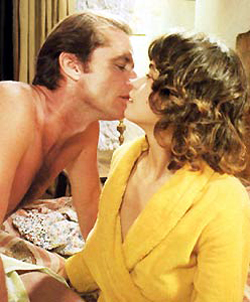|
|

The Great Escape:
Antonioni’s THE PASSENGER
By Rod Schecter
While Michelangelo Antonioni’s The Passenger leaves us with a million questions about the impossibility of switching
identities, any red- (or blue) blooded American weaned on mainstream media will tell you how necessary it is to escape into
the lives contained within the veritable nexus of the Hollywood commercial panorama. I mean—who hasn’t wanted to pop on
the bat suit for a quick romp through Gotham (let’s not even mention the car) or step into a magic wardrobe and be
instantly transported into a land of ice queens and conversational lions (who just happen to be fluent English speakers)? In fact, our very culture demands it. And even if you don’t want to be a rigid fiancé taken to her better
half’s family home for a weekend of good old American dysfunction or a hardened geisha vying for an identity of her own,
we can certainly escape into their stories—at least for a little while.
But while most of us see our momentary lapses into the more (or less) exciting life of someone else as temporary,
Jack Nicholson’s David Locke seizes the opportunity to escape permanently in Michelangelo Antonioni’s cinematic magnum opus,
The Passenger, recently re-released in theaters. While David Locke’s motives are more complex than the need to be entertained,
it seems that he is intent on leaving his life behind in this amazing cinematic achievement that seems even more relevant in
2005 than it did when the movie was first released in 1975. However, the theatrical re-release of the film that was formerly
a part of Jack Nicholson’s private collection was just a wonderful prelude to the release of the DVD that brings home, in its
original form, the crucial social underpinnings of identity in a world where what you do seems to define who or what you are.
Interestingly, The Passenger’s long absence from circulation except for the grainy VHS copies that stood as the gem of a
cinephile’s collection, was because Nicholson wanted to own the film as a private and self-possessed piece of art unseen by others.
Stationed in the desert and gathering film footage for a TV piece on guerilla warfare in Algeria, famed journalist
David Locke (played to perfection by a sleek and often subdued Nicholson) finds himself burned out and tired of his life.
Reaching his hotel after a botched trip to meet the guerilla fighters that will finalize his story, he finds, in the adjacent
hotel room, a man who was an acquaintance of his dead from a persisting (and naturally occurring) heart condition. Known only as
Robertson, the dead man played by Charles Mulvehill, is of similar height and build as Locke—and for motivations at once
mysterious and captivating, Locke decides to leave his wife, adopted child, and successful job to escape into somebody else’s life.
I suppose this is where the classic philosophical question begins to take shape as we are forced to understand whether it’s freedom from his past that motivates him to switch identities with Robertson or the freedom to start again. Antonioni, however, leaves this all up to us as he creates a uniquely stylized vision, bereft of score and peppered with sparse dialogue, which simply suggests the methods behind Locke’s momentary madness and acute emotional isolation. In fact, most of the primary dramatic tension in
this film takes place without musical accompaniment—an interesting technique that amplifies the drama and alienates us much
in the same way that Locke has alienated himself, thereby reducing the events to existential occurrences for us to view without
the moral weight of tonality to tell us how to feel. It also seems that Antonioni is no stranger to irony as it just so
happens that Robertson turns out to be the arms dealer providing the weapons to the very guerillas Locke was looking for in
the first place.
 We soon learn from a conversation between Locke and Roberston shaped through expertly cut flashbacks that Locke is determined
to trade in his reporter’s life and the subjective world of images, ideas, and perception for what he hopes is a more concrete
one. He proceeds to leaf through Robertson’s appointment book and thus we embark on Locke’s journey that melds privacy with
anonymity—and isolation with intimacy—all played out on some of the most lushly picturesque scenery every recorded on film.
Panoramic wide shots abound as Locke travels through Munich, Barcelona, and rural Spain, making us believe that true freedom
may actually await him even after he meets with Robertson’s contacts and delivers the sensitive materials from Robertson’s
secret hiding place in an airplane locker.
We soon learn from a conversation between Locke and Roberston shaped through expertly cut flashbacks that Locke is determined
to trade in his reporter’s life and the subjective world of images, ideas, and perception for what he hopes is a more concrete
one. He proceeds to leaf through Robertson’s appointment book and thus we embark on Locke’s journey that melds privacy with
anonymity—and isolation with intimacy—all played out on some of the most lushly picturesque scenery every recorded on film.
Panoramic wide shots abound as Locke travels through Munich, Barcelona, and rural Spain, making us believe that true freedom
may actually await him even after he meets with Robertson’s contacts and delivers the sensitive materials from Robertson’s
secret hiding place in an airplane locker.
However, we soon find out that escape isn’t really an option as he begins to encounter various pieces of the life both he and
Robertson left behind. His TV producer begins reviewing old footage of his interviews and his wife Rachel, played by Jenny
Runacre, uncovers information that makes her suspect he is still alive. So what begins as a linear narrative soon becomes a
multifaceted montage that allows us to piece the film together on our own as we slowly come to realize that all the narratives
must inevitably intersect for the story to reach its completion.
In the first of many near misses with a past that won’t seem to forget him, we find Locke in Barcelona where in order to
escape a colleague he enlists into his company a young student played by Maria Schneider, still redolent of the steaminess
of Last Tango In Paris. Their playful and charismatic interactions breathe new life into the story as they make their way
across Antoni Gaudi’s city—an architectural wonderland that projects a vision and sensibility as unique as Antonioni’s own.
“What are you running away from?” asks Schneider in her soft European accent as their convertible departs Barcelona in a scene
as memorable as Bacall and Bogie’s famous “pucker up and blow.” A question that mirrors what we are all asking as Locke
innocently instructs: “Turn your back to the front seat.”
Yet the camera shows us not what is behind them but a romantic shot of Schneider smiling dreamily as the wind cuts through her
hair and the trees jettison past her, making us feel that, at least for her, there is still hope of escaping—of eschewing the
world we’ve created for a new one with all the promise of the first without any of the disappointment—in essence a counterpoint
to life.
It isn’t until later when reality sets in that we realize escape is impossible, both literally (as we see Robertson’s contacts
skulking around on the periphery, obviously aware they have been duped) and metaphorically, as even Locke himself admits to
Schneider that he’s the only person he’s ever known.
In this interlude, it is clear, however, that he has finally transitioned from observer to participant—a fact that is
consistently highlighted by conversations and interesting snippets of past interviews with governmental figures who act as
signposts for the subjective nature of identity and perception in both the political and social realms. A fact that is driven
home when he tells his ingenue that instead of becoming, say, a novelist in Cairo, he has assumed the identity of a gun runner.
Asked what she thinks of that she responds coyly, “ . . . I guess it depends on which side you’re on.”
While one might make the argument that Antonioni is hitting you over the head with the numerous threads of subjectivity that
seem to be the fabric of this thought provoking masterpiece one might also argue that he is trying to turn this idea on its head
by providing fuel to the questions that arise from the ever-shifting political currents in regions where a man could be king one
day and in front of the firing squad the next. More important, however, is the impact it has on the individual in a society where
one can never truly escape public life and all the expectations it both brings and leaves behind.
So, if irony weren’t a component of artistic vision, we might be able to ignore the fact that instead of being liberated, and,
in a word—free—from his past life, Locke ultimately becomes trapped by his escape, caged once again by his choices. Ultimately
it seems that the very impulses and actions he thought would free him have only pushed him into a narrow chasm where each move
becomes determined by sheer avoidance. He must, in effect, behave like a fugitive whose forward motion is in direct opposition
with the ghosts of his past (i.e. his wife who is working with the police to find him, and ultimately Robertson’s nefarious
contacts).
And no one knows this better than Locke who, despite the inevitable, still tries to make room for the fact that he might
actually achieve the freedom he desires, growing more hopeless and depressed as he realizes that there is really only one
exit—an exit that becomes more and more obvious as his journey reaches its end. So while Locke thought he could become someone
else, he becomes painfully aware that he is still the same old person just wearing someone else’s clothing. A depressing notion
that I’m not so sure I want to accept, but a notion that demands us to recognize that maybe the masquerade is all we could ever
hope for in a reality where private identity is so influenced by the waves of public perception.
While all of this is obviously up for conjecture, it stands to reason that perhaps Antonioni’s real statement on identity in
this film is that there’s actually no such thing as personal identity or private life but only a collective one—a shared persona
based on the beliefs of the masses that, as Locke so aptly puts it, “conforms to their expectations.” Perhaps this is why the
famous last seven minutes are shot through the caged motel room window—to show that no matter what occurs beyond the bars, no
matter what you think you see, you are still in essence a prisoner caged by the world you live in.
 While Antonioni’s vision may be too dark for most mainstream entertainment consumers, The Passenger still stands up as a
cultural testament to the themes that seem so prominent both historically and in modern life. Heavy handed monologues
notwithstanding (Locke’s monologue about the blind man gaining sight—only to “see things as they really are” and find suicide
the only option, for instance), The Passenger feels fresh and relevant—although some of my fellow audience members seemed less
than fulfilled…
While Antonioni’s vision may be too dark for most mainstream entertainment consumers, The Passenger still stands up as a
cultural testament to the themes that seem so prominent both historically and in modern life. Heavy handed monologues
notwithstanding (Locke’s monologue about the blind man gaining sight—only to “see things as they really are” and find suicide
the only option, for instance), The Passenger feels fresh and relevant—although some of my fellow audience members seemed less
than fulfilled…
A far more demanding cinematic experience than the normal Hollywood fare, The Passenger takes it’s sweet time delivering
the aesthetic flow and beauty that makes it a venerable gem amid the mélange of pseudo-serious holiday movies you’re bound to
run into this season.
Or was I not gving those fellow theater goers enough credit, making Antonioni right all along? Could the film simply have failed to
conform to the collective expectations of our well-trained entertainment nation? And if so, you’ve got to ask yourself: do
you want to be part of a collective identity that can only escape into a cage built from the whims of homogeneity?
|
|






















 We soon learn from a conversation between Locke and Roberston shaped through expertly cut flashbacks that Locke is determined
to trade in his reporter’s life and the subjective world of images, ideas, and perception for what he hopes is a more concrete
one. He proceeds to leaf through Robertson’s appointment book and thus we embark on Locke’s journey that melds privacy with
anonymity—and isolation with intimacy—all played out on some of the most lushly picturesque scenery every recorded on film.
Panoramic wide shots abound as Locke travels through Munich, Barcelona, and rural Spain, making us believe that true freedom
may actually await him even after he meets with Robertson’s contacts and delivers the sensitive materials from Robertson’s
secret hiding place in an airplane locker.
We soon learn from a conversation between Locke and Roberston shaped through expertly cut flashbacks that Locke is determined
to trade in his reporter’s life and the subjective world of images, ideas, and perception for what he hopes is a more concrete
one. He proceeds to leaf through Robertson’s appointment book and thus we embark on Locke’s journey that melds privacy with
anonymity—and isolation with intimacy—all played out on some of the most lushly picturesque scenery every recorded on film.
Panoramic wide shots abound as Locke travels through Munich, Barcelona, and rural Spain, making us believe that true freedom
may actually await him even after he meets with Robertson’s contacts and delivers the sensitive materials from Robertson’s
secret hiding place in an airplane locker.
 While Antonioni’s vision may be too dark for most mainstream entertainment consumers, The Passenger still stands up as a
cultural testament to the themes that seem so prominent both historically and in modern life. Heavy handed monologues
notwithstanding (Locke’s monologue about the blind man gaining sight—only to “see things as they really are” and find suicide
the only option, for instance), The Passenger feels fresh and relevant—although some of my fellow audience members seemed less
than fulfilled…
While Antonioni’s vision may be too dark for most mainstream entertainment consumers, The Passenger still stands up as a
cultural testament to the themes that seem so prominent both historically and in modern life. Heavy handed monologues
notwithstanding (Locke’s monologue about the blind man gaining sight—only to “see things as they really are” and find suicide
the only option, for instance), The Passenger feels fresh and relevant—although some of my fellow audience members seemed less
than fulfilled…


















